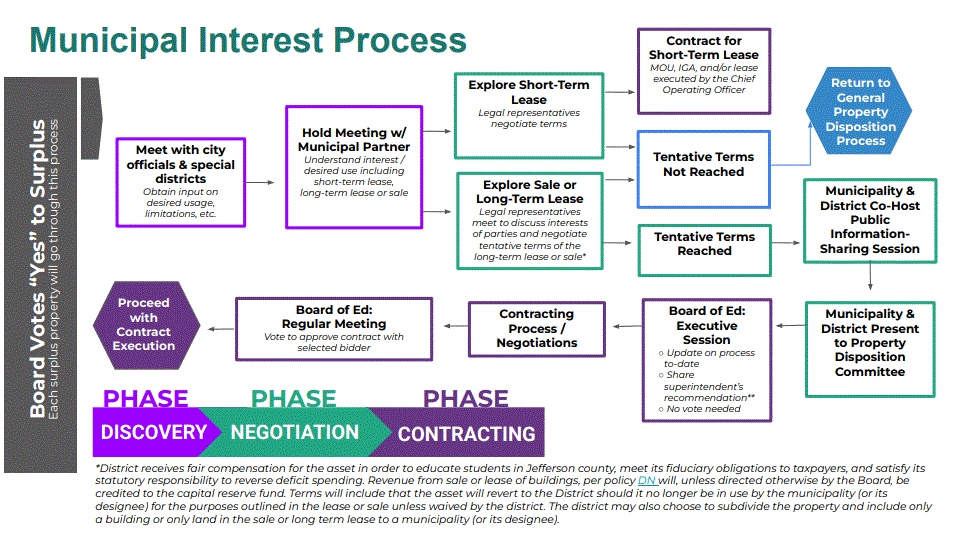Correction 9/21/24: There is no single commercial applicant currently under consideration for the Vivian property. This month, following a pre-qualification process, several applicants were invited to submit final proposals which are due in October.
Correction 9/26/24: Paula Reed represents District 2, not District 1. District 2 includes Green Mountain and Lakewood High Schools . Erin Kenworthy is District 4 which has Alameda High School and the now closed Emory Elementary. Three Board Members are up for election this year: Danielle Varda – District 1, Paula Reed – District 2 and Mary Parker – District 5
Thank you readers for your corrections and information!
An untested process caused misunderstandings and hiccups resulting in delays to Lakewood purchasing shuttered Jeffco schools. Lakewood is now negotiating to buy 3 acres of Vivian Elementary School. They are also still asking about acquiring Emory Elementary for use by the Action Center. At a meeting on September 13, 2024, City Councilors and Jeffco School Board Members were able to get a lot of their positions stated for the record; however, this remains a closed process with both managers negotiating on a staff level. There has been no presentation to the public of a plan for school properties. School district documents show that the district must approve the use designation. That means that Lakewood must have presented their plans for the Action Center months ago, during the same time Lakewood Mayor and City Manager were calling the stories “misinformation”.
City officials appeared united in their efforts to buy school property at less than market-rate for city use or for general community sustainability. They cited multiple reasons for deserving a price break:
- Due to the trauma of the school closures, giving the property to a deserving party for less than market-rate would be healing
- The school board has a history of giving property away for community use so they should stand by that precedent (two examples cited including a property sold to Gold Crown for $1)
- Non-profits like the Action Center do a great community service and there should be an equivalent value included in the decision-making process
School District officials were divided in their response. Although everyone from both organizations signaled their willingness to work together, officials are making hard decisions.
Danielle Varda acknowledged the many great ideas they have received for using each building but said there is no way the district can give away all those properties because constituents expect proper fiscal management of public dollars.
“What I’ve been concerned about since day one is that we have a fair process that’s very public, that all people follow and there’s no backdoor deals, no handshakes.” – Daniella Varda
Paula Reed encouraged a new metric to be added to the evaluation process so that properties could be utilized for other uses, not necessarily getting market-rate. She said that Board Members have a fiduciary responsibility to ensure that all assets are used for student education but there are lots of ways to contribute to that, including community sustainability. Reed represents School Board District 1, which covers Lakewood schools
School Board President Mary Parker pointed out that every time they would make a deal with one city, another city would expect the same. Indeed, City Council Member Mayott-Guerrero already brought up Mulholm Elementary in her ward, which is not up for disposition yet, but would be of interest to residents there.
Purchase proceedings were held up not only by price but by parcel size. Lakewood seems to be asking for 3 of the 9.9 acres of Vivian Elementary School property, which will be used as a park. One of the initial guiding principles of the School Board was that the property not be subdivided, which contributed to Lakewood’s delayed offer. Under the old rules, Lakewood could not buy just three acres.
Now the school board is rethinking its decision and will allow subdivision. Lakewood is in active negotiation for the 3 acres of Vivian. The rest of the land is being considered by Cardel Homes (among others) for development. There was no Council discussion about Vivian’s purchase but the residents there have mounted intense public pressure to preserve the land and it has been discussed in ward meetings, indicating some Council Members knew of the plan. Apparently, a new purchase option was issued to show the 3 acres as separate but Lakewood Informer cannot readily find that information.
Lakewood has already met once in a mysterious executive session that did not include a specific reason, contrary to Colorado Open Meetings Law. However, at the end of Monday’s study session, Council agreed to another executive session on September 19 to confirm negotiations on a school property. That meeting agenda also does not state the specific property or use they are negotiating for.
The case for Emory Elementary is less clear. Council Member Shahrezaei asked the hard question about whether Lakewood could get the property in exchange for community use. There were no easy answers to that question and no apparent change to Lakewood’s plan to purchase the entire property and let the Action Center use it.
Lakewood may have the same dilemma as the school district if they start giving any non-profit preferential deals, especially if there are multiple properties purchased.
The Municipal Option for school property purchases seems to be in flux as Jeffco schools test the process on Lakewood. According to the posted process (below), Lakewood and Jeffco Schools should have a joint public session after negotiations have concluded. At this point on Sept 18, it is all being handled by privately by staff.

School district officials seem willing to engage in a public discussion about property use but it’s a fast-moving process. Lakewood is finalizing negotiations on Thursday morning. As of Tuesday night the district website does not show an updated status for the school properties.
